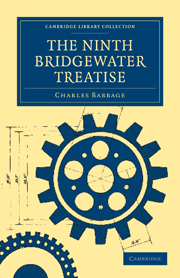Book contents
- Frontmatter
- Contents
- Preface
- Title in the Series
- CHAPTER I Nature of the Argument
- CHAPTER II Argument in favour of Design from the changing of Laws in Natural Events
- CHAPTER III Argument to show that the Doctrines in the preceding Chapter do not lead to Fatalism
- CHAPTER IV On the Account of the Creation, in the First Chapter of Genesis
- CHAPTER V Further View of the same Subject
- CHAPTER VI Of the Desire of Immortality
- CHAPTER VII On Time
- CHAPTER VIII Argument from Laws intermitting—on the Nature of Miracles
- CHAPTER IX On the permanent Impression of our Words and Actions on the Globe we inhabit
- CHAPTER X On Hume's Argument against Miracles
- CHAPTER XI À priori Argument in favour of the Occurrence of Miracles
- CHAPTER XII Thoughts on the Nature of Future Punishments
- CHAPTER XIII Reflections on Free Will
- CHAPTER XIV Thoughts on the Origin of Evil
- CONCLUSION
- APPENDIX
- NOTE A On the great Law which regulates Matter
- NOTE B On the Calculating Engine
- NOTE C Extract from the Theory of Probabilities of La Place
- NOTE D Note to Chap. VIII. on Miracles
- NOTE E Note to Chap. X. on Hume's Argument against Miracles
- NOTE F On the Consequences of Central Heat
- NOTE G On the Action of Existing Causes in producing Elevations and Subsidences in Portions of the Earth's Surface
- NOTE H Tables showing the Expansion of Beds of Granite variously heated
- NOTE I Extracts from Letters of Sir John Herschel
- NOTE K On the Elevation of Beaches by Tides
- NOTE L On Ripple Mark
- NOTE M On the Age of Strata, as inferred from the Rings of Trees embedded in them
- NOTE N On a Method of multiplying Illustrations from Wood-Cuts
- CORRECTIONS
NOTE A - On the great Law which regulates Matter
Published online by Cambridge University Press: 05 October 2010
- Frontmatter
- Contents
- Preface
- Title in the Series
- CHAPTER I Nature of the Argument
- CHAPTER II Argument in favour of Design from the changing of Laws in Natural Events
- CHAPTER III Argument to show that the Doctrines in the preceding Chapter do not lead to Fatalism
- CHAPTER IV On the Account of the Creation, in the First Chapter of Genesis
- CHAPTER V Further View of the same Subject
- CHAPTER VI Of the Desire of Immortality
- CHAPTER VII On Time
- CHAPTER VIII Argument from Laws intermitting—on the Nature of Miracles
- CHAPTER IX On the permanent Impression of our Words and Actions on the Globe we inhabit
- CHAPTER X On Hume's Argument against Miracles
- CHAPTER XI À priori Argument in favour of the Occurrence of Miracles
- CHAPTER XII Thoughts on the Nature of Future Punishments
- CHAPTER XIII Reflections on Free Will
- CHAPTER XIV Thoughts on the Origin of Evil
- CONCLUSION
- APPENDIX
- NOTE A On the great Law which regulates Matter
- NOTE B On the Calculating Engine
- NOTE C Extract from the Theory of Probabilities of La Place
- NOTE D Note to Chap. VIII. on Miracles
- NOTE E Note to Chap. X. on Hume's Argument against Miracles
- NOTE F On the Consequences of Central Heat
- NOTE G On the Action of Existing Causes in producing Elevations and Subsidences in Portions of the Earth's Surface
- NOTE H Tables showing the Expansion of Beds of Granite variously heated
- NOTE I Extracts from Letters of Sir John Herschel
- NOTE K On the Elevation of Beaches by Tides
- NOTE L On Ripple Mark
- NOTE M On the Age of Strata, as inferred from the Rings of Trees embedded in them
- NOTE N On a Method of multiplying Illustrations from Wood-Cuts
- CORRECTIONS
Summary
Ever since the period when Newton established the great law of gravity, philosophers have occasionally speculated on the existence of some more comprehensive law, of which gravity itself is the consequence. Although some have considered it vain to search for a more general law, the great philosopher himself left encouragement to future inquirers; and the time, perhaps, has even now arrived, when such a discovery may be near its maturity. It would occupy too much space to introduce many illustrations of this opinion; there is, however, one which deserves attention, because it is not merely a happy conjecture, but the hypothesis on which it rests has been carried by its author, through the aid of profound mathematical reasoning, to many of its remote consequences.
M. Mosotti has shown, that by supposing matter to consist of two sorts of particles, each of which repels similar particles, directly as the mass, and inversely as the squares, of their distances; whilst each attracts those of the other kind, also according to the same law,—then the resulting attractions explain all the phenomena of electricity, and there remains a residual force, acting at all sensible distances, according to the law of gravity.
Many of the discoveries of the present day point towards a more general law; and many of the philosophers of the present time anticipate its near approach.
- Type
- Chapter
- Information
- The Ninth Bridgewater Treatise , pp. 163 - 169Publisher: Cambridge University PressPrint publication year: 2009First published in: 1837



